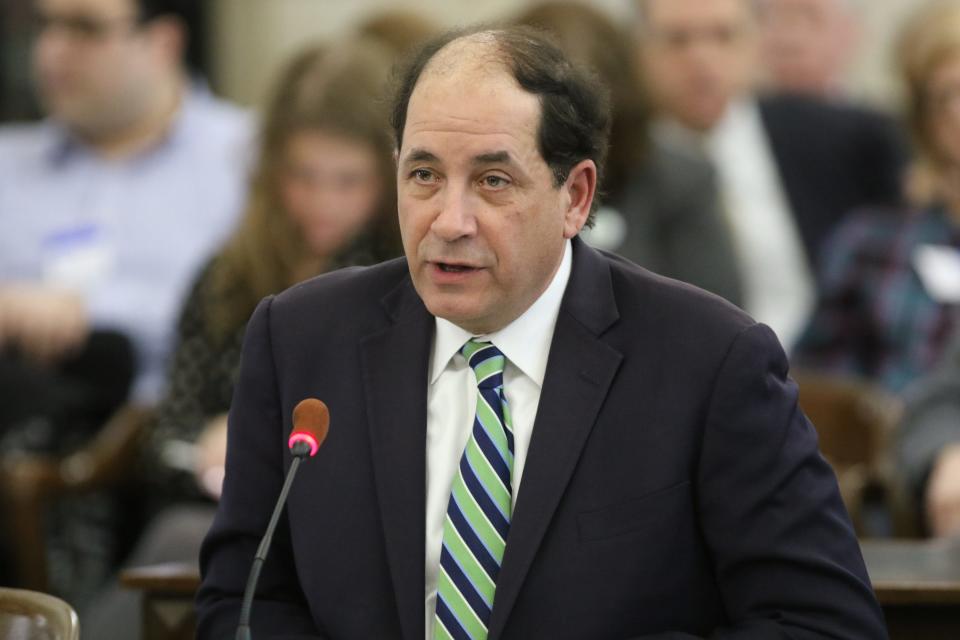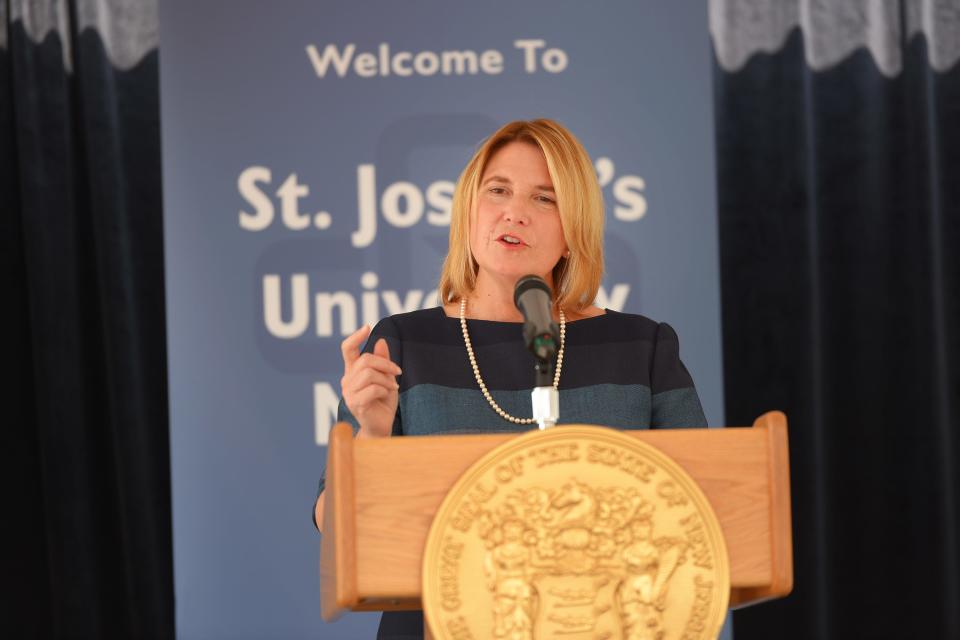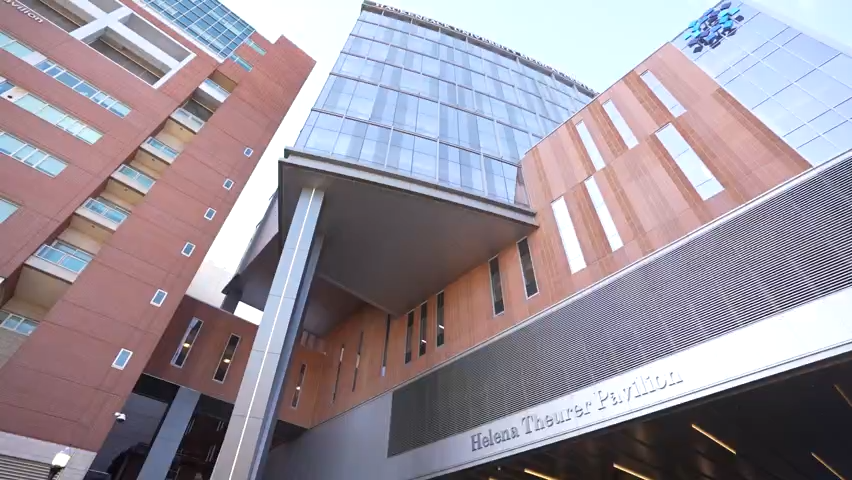The battle over NJ hospital prices: Will more transparency lead to lower bills?
Hospitals in New Jersey and across the nation have been required since 2021 to list prices for all procedures, to give patients the ability to shop around and possibly lower health care costs through open market competition.
But patient advocacy groups and some of the largest labor unions in New Jersey say the system is not working.
Some hospitals aren’t following the federal rules, they say.
Medical bills are often much higher for common procedures than the estimates posted on hospital websites.
Story continues below photo gallery.
And the prices that are published include massive sets of data difficult for patients to navigate — making it a steep challenge for them to calculate their out-of-pocket costs.
Now efforts are being made at the federal level, where a bipartisan bill in Congress would make it easier for patients to see more prices, and at the state level, where a bill has been introduced that would put some extra teeth in enforcement.
Rising premiums and deductibles
The issue was brought to the spotlight last week with hearings held in New Jersey on Monday and in Washington on Wednesday. The head of benefits for New Jersey’s largest police union urged members of Congress to help curb rising premiums and deductibles for his 30,000 members.
Health care pricing “is one of the least transparent, most shrouded aspects of our society — despite the fact it comprises one-fifth of our economy,” Kevin Lyons, director of benefits for the New Jersey State Policemen’s Benevolent Association, told the House Health Subcommittee.
But representatives for New Jersey hospitals say they are as transparent as the regulations from the federal Centers for Medicare & Medicaid Services call for. The gigantic spreadsheets of prices are formatted to comply with the federal rules.
Easier-to-read estimates for a few hundred common procedures on hospital websites are hard to calculate since almost every patient requires different levels of care, said Christine Stearns, a lobbyist for the New Jersey Hospital Association.
“We believe that the current CMS hospital price transparency requirements are comprehensive and already ensure a robust level of transparency for consumers,” Stearns wrote to members of the state Senate health committee last week.
More: Wiping out NJ medical debt: Can Murphy's plan make a dent in millions in unpaid bills?
More: Are New Jerseyans getting sicker? Hospital report shows spike in chronic conditions
The move for more transparency on prices comes as health insurance rates are soaring, hospital expenses are skyrocketing and New Jerseyans are paying more and more in premiums, deductibles and other out-of-pocket costs.
Having easily accessible pricing would drive prices down because consumers would be able to shop around, as with most any service, advocates say.
The latest data shows that 70% of hospitals nationally were in compliance by fall 2022, up from 27% at the start of 2021, Stearns said.
Advocates say compliance is much lower. Only 41% of New Jersey’s hospitals fully comply with the federal regulations, said Ilaria Santangelo, director of research at Patient Rights Advocate, a national nonprofit group.
One of the biggest problems is that many New Jersey hospitals list an “incomprehensible amount of hyphens, dashes, blanks and various forms of non-pricing information instead of actual prices,” she told the state committee.
NJ bill would localize enforcement
A bill by Sen. Joe Vitale, D-Middlesex, essentially copies what the federal regulations already require hospitals to do. But it gives enforcement power to the state instead of relying on Washington to ensure compliance. The state Department of Health would monitor hospitals' published prices and issue yet-to-be-calculated fines if they are not in compliance.
At a hearing last week in Trenton, several union leaders and patient advocates supported the measure, with the New Jersey Hospital Association the lone opponent. Union leaders said their members' health care costs have increased rapidly in the last few years since the COVID-19 pandemic, with hospital costs leading the way.

Hospital spending accounts for 44% of all dollars that the 32BJ SEIU service workers' union's health fund spends on health care — the single largest spending category, with doctor's office and urgent care visits, medicine, and dental and vision benefits trailing behind.
"Nothing compares to what we have to pay for our hospital bills," said Kevin Brown, state director for 32BJ SEIU, representing 14,000 building service workers. "And we know those hospital prices continue to grow faster than all other health care spending."
Stearns, of the New Jersey Hospital Association, told the committee that the bill serves little purpose since it only duplicates the federal rule and would create an "unnecessary administrative burden and divert resources from patient care with minimal additional benefits to our patients."
Though the hospitals association did not have data on how many of its members have complied fully with the federal regulations, its president, Cathy Bennett, said no New Jersey hospital has been cited for non-compliance.

Santangelo, of Patient Rights Advocate, said enforcement by federal authorities so far has been inadequate. The state bill would “add a needed enforcement mechanism that is lacking at the federal level,” she told the committee.
Bennett said the state bill would add unnecessary costs to the health care system by forcing hospital staff to do duplicative work because the measure does not meet the latest federal requirements. "The proposed legislation adds unnecessary bureaucracy, not clarity," she said in a statement.
Conservatives, liberals unite on issue
Another bill introduced late last year in the U.S. Senate called the "Health Care Prices Revealed and Information to Consumers Explained Transparency Act" has gotten the support of unlikely bedfellows in conservative Republican Sen. Mike Braun of Indiana and liberal Sen. Bernie Sanders of Vermont.
The bill calls for all negotiated rates — such as with insurance companies and cash prices — to be more easily accessible to the public. Labs, imaging centers and ambulatory surgical centers would also have to post prices under the measure. It would provide real prices, not estimates, for 300 services and then expand to all services by 2025.
It's unclear if the bill would make the data more digestible — a common complaint among supporters of transparency. Two of the largest hospitals in the state — Hackensack University Medical Center and Bergen New Bridge Medical Center — have 348,298 and 496,091 rows, respectively, in their pricing spreadsheets.
Skyrocketing costs for hospitals, patients
Many hospitals across the U.S. say their prices reflect skyrocketing costs to do business. Inflation combined with staffing shortages that require more expensive contract labor caused a 17% increase in overall hospital expenses nationwide between 2019 and 2022, said a report by the American Hospital Association.
In New Jersey, those expenses are being racked up at a time when hospitals are also in a building boom. Hackensack University Medical Center recently opened its $714 million Helena Theurer surgical and intensive care tower, for instance, and Valley Health's new $868 million hospital in Paramus is scheduled to open in April.

It also comes at a time when hospitals are admitting sicker patients, whose treatment is more costly. Data collected by the New Jersey Hospital Association shows a 21% increase between 2019 and 2022 in patients with illnesses classified as "major or extreme," which the report suggests is an indirect result of delayed care due to the COVID-19 pandemic.
On the patient side, the push for more transparency comes at a time of skyrocketing health care costs. Insurance premiums for family coverage have increased 22% nationally since 2018 and 47% since 2013, the Kaiser Family Foundation said.
Likewise, New Jersey taxpayers are paying more as insurance premiums shot up 21% for government employees and 15% for school employees last year, resulting in workers paying more and taxpayers picking up the difference.
Lyons, the state PBA benefits director, said in an interview that the police officers he represents saw a 23% increase in the price of their health care coverage last year. While more transparency in hospital pricing may not solve everything, it will help slow the rate, he said. It will also help his members choose the right hospital for them.
"Sunlight is the best disinfectant," Lyons said. "But what hospitals are required to do now is extremely difficult to understand. They kill you with data to the point where I can't tell you how much it costs to get something as common as a colonoscopy."
This article originally appeared on NorthJersey.com: Will more transparency lower cost of NJ hospital care?

